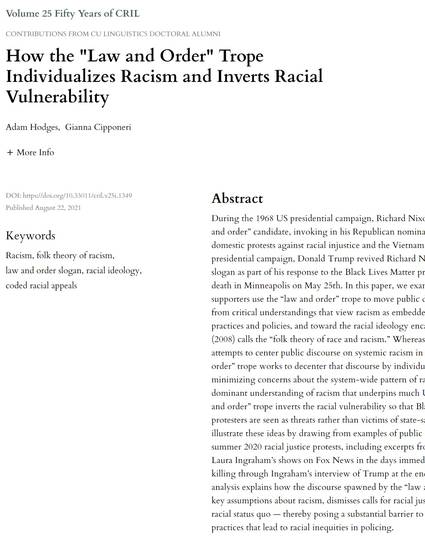
Article
How the ‘Law and Order’ Trope Individualizes Racism and Inverts Racial Vulnerability
Colorado Research in Linguistics
(2021)
Abstract
During the 1968 US presidential campaign, Richard Nixon infamously ran as the “law and order” candidate, invoking in his Republican nomination acceptance speech the domestic protests against racial injustice and the Vietnam war. In the 2020 presidential campaign, Donald Trump revived Richard Nixon’s “law and order” slogan as part of his response to the Black Lives Matter protests after George Floyd’s death in Minneapolis on May 25th. In this paper, we examine how Trump and his supporters use the “law and order” trope to move public discourse about racism away from critical understandings that view racism as embedded in institutionalized practices and policies, and toward the racial ideology encapsulated in what Jane Hill (2008) calls the “folk theory of race and racism.” Whereas the racial justice movement attempts to center public discourse on systemic racism in policing, the “law and order” trope works to decenter that discourse by individualizing racism and thereby minimizing concerns about the system-wide pattern of racism. As it reinforces the dominant understanding of racism that underpins much US public discourse, the “law and order” trope inverts the racial vulnerability so that Black bodies and racial justice protesters are seen as threats rather than victims of state-sanctioned violence. We illustrate these ideas by drawing from examples of public discourse in response to the summer 2020 racial justice protests, including excerpts from Tucker Carlson and Laura Ingraham’s shows on Fox News in the days immediately following Floyd’s killing through Ingraham’s interview of Trump at the end of the summer. Our analysis explains how the discourse spawned by the “law and order” trope reinscribes key assumptions about racism, dismisses calls for racial justice, and perpetuates the racial status quo — thereby posing a substantial barrier to changing the policies and practices that lead to racial inequities in policing.
Keywords
- folk theory of racism,
- law and order slogan,
- racial ideology,
- coded racial appeals,
- political discourse,
- language and racism,
- racism,
- Black Lives Matter,
- Richard Nixon,
- Donald Trump
Disciplines
Publication Date
August 30, 2021
DOI
https://doi.org/10.33011/cril.v25i.1349
Citation Information
Adam Hodges and Gianna Cipponeri. "How the ‘Law and Order’ Trope Individualizes Racism and Inverts Racial Vulnerability" Colorado Research in Linguistics Vol. 25 (2021) Available at: http://works.bepress.com/adamhodges/114/
